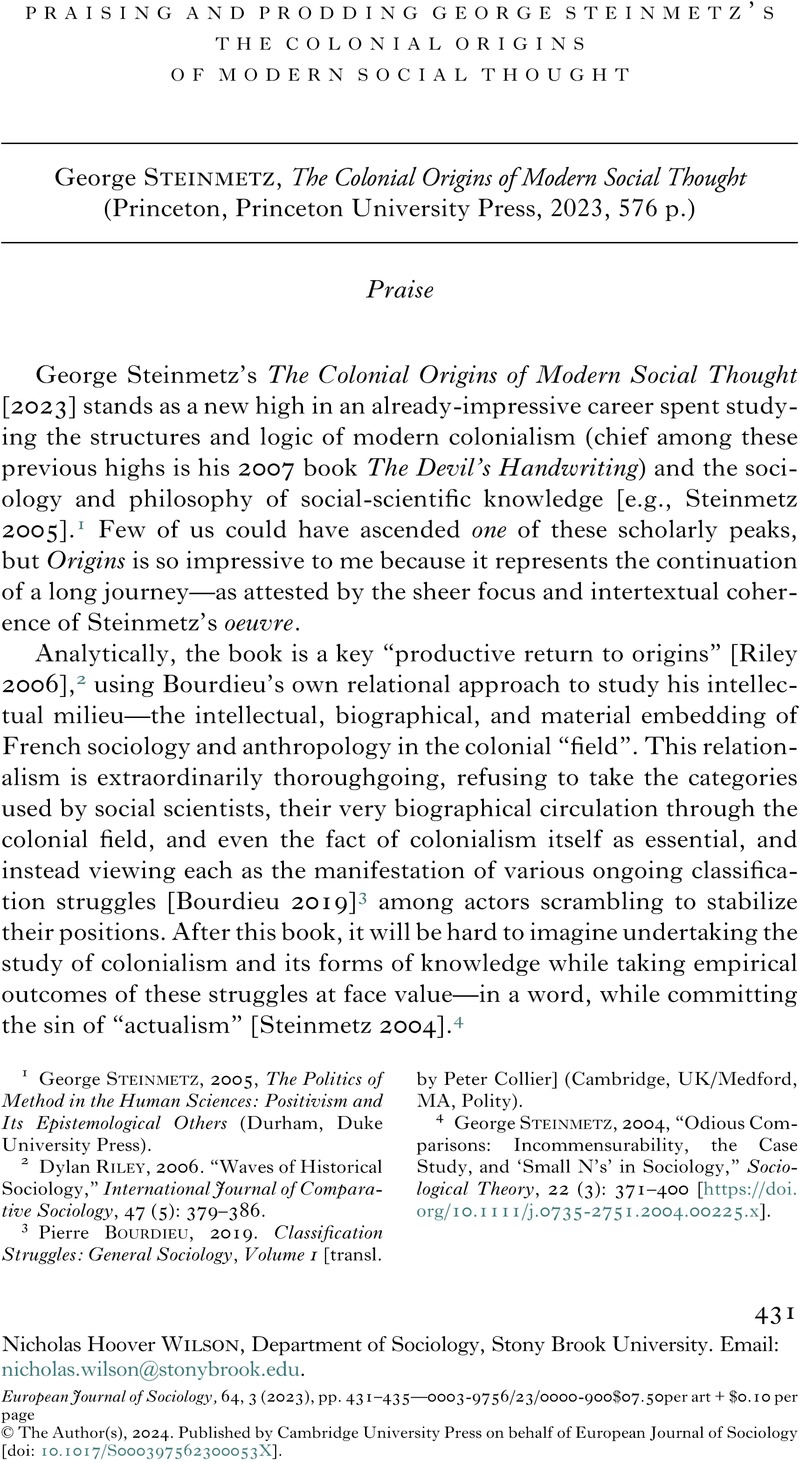No CrossRef data available.
Article contents
Praising and Prodding George Steinmetz’s The Colonial Origins of Modern Social Thought - George Steinmetz, The Colonial Origins of Modern Social Thought (Princeton, Princeton University Press, 2023, 576 p.)
Review products
Published online by Cambridge University Press: 05 January 2024
Abstract

- Type
- Book Review
- Information
- European Journal of Sociology / Archives Européennes de Sociologie , Volume 64 , Issue 3 , December 2023 , pp. 431 - 435
- Copyright
- © The Author(s), 2024. Published by Cambridge University Press on behalf of European Journal of Sociology
References
1 Steinmetz, George, 2005, The Politics of Method in the Human Sciences: Positivism and Its Epistemological Others (Durham, Duke University Press).CrossRefGoogle Scholar
2 Riley, Dylan, 2006. “Waves of Historical Sociology,” International Journal of Comparative Sociology, 47 (5): 379–386 CrossRefGoogle Scholar.
3 Bourdieu, Pierre, 2019. Classification Struggles: General Sociology, Volume 1 [transl. by Collier, Peter] (Cambridge, UK/Medford, MA, Polity).Google Scholar
4 Steinmetz, George, 2004, “Odious Comparisons: Incommensurability, the Case Study, and ‘Small N’s’ in Sociology,” Sociological Theory, 22 (3): 371–400 CrossRefGoogle Scholar [https://doi.org/10.1111/j.0735-2751.2004.00225.x].
5 Camic, Charles, 1983, Experience and Enlightenment: Socialization for Cultural Change in Eighteenth-Century Scotland (Edinburgh, Edinburgh University Press).Google Scholar
6 Mannheim, Karl, 1985, Ideology and Utopia (New York, Houghton Mifflin Harcourt).Google Scholar
7 Shapin, Steven, 1994, A Social History of Truth: Civility and Science in Seventeenth-Century England (Chicago, University of Chicago Press)CrossRefGoogle Scholar; Shapin, St, 2008. The Scientific Life: A Moral History of a Late Modern Vocation (Chicago, University of Chicago Press).CrossRefGoogle Scholar
8 Gross, Neil, 2008, Richard Rorty: The Making of an American Philosopher (Chicago, University of Chicago Press).CrossRefGoogle Scholar
9 Dan, Geary, 2009, Radical Ambition: C. Wright Mills, the Left, and American Social Thought (Berkeley, CA, University of California Press)Google Scholar.
10 Connell, Raewynn. W., 1997, “Why Is Classical Theory Classical?” American Journal of Sociology 102 (6): 1511–1557 CrossRefGoogle Scholar [https://doi.org/10.1086/231125]; Julian Go, 2017, “Decolonizing Sociology: Epistemic Inequality and Sociological Thought,” Social Problems, 64 (2): 194–199 [https://doi.org/10.1093/socpro/spx002].
11 I, for one, won’t be able to read of Bourdieu’s habitus again without thinking of niya, rather than Aristotle [see Steinmetz 2023, 339–341]!
12 Abbott, Andrew, 2016, “The Demography of Scholarly Reading,” The American Sociologist 47 (2): 302–318 CrossRefGoogle Scholar [https://doi.org/10.1007/s12108-016-9315-z].
13 Popper, Karl R., Ryan, Alan and Gombrich, Ernst H., [1945] 2013. The Open Society and Its Enemies: New One-Volume Edition (Princeton, NJ, Princeton University Press).Google Scholar
14 Steinmetz, George, 2007, The Devil’s Handwriting (Chicago, University of Chicago Press).CrossRefGoogle Scholar
15 Steinmetz, George, 2023, The Colonial Origins of Modern Social Thought (Princeton, NJ, Princeton University Press).Google Scholar




